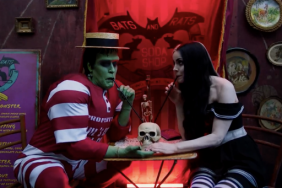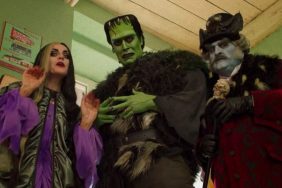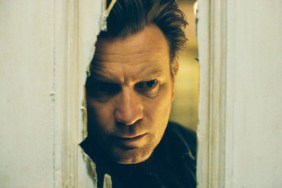With The Lords of Salem, Rob Zombie has finally graduated from his excitable redneck torture family obsessions into something more meaningful, something contemplative, something that reflects the power of history to inspire our popular culture, and something that examines the effect that very entertainment has on the subconscious human mind. In other words… something a little dull.
The Lords of Salem is Zombie’s sixth feature film, and with the possible exception of The Haunted World of El Superbeasto, which I haven’t seen, it’s his most mature work to date. (It seems unlikely that El Superbeasto is a major contender.) It’s the story of a normal person, Heidi Hawthorne (Sheri Moon Zombie), who does normal things. She has tattoos and works as a radio DJ with co-hosts Jeff Daniel Phillips and Ken Foree, but aside from her obvious love of music it’s just a job. She lives a quiet life with her dog in a Salem, MA apartment complex, keeps to herself mostly, and attends her Narcotics Anonymous meetings like a responsible adult. She’s kind, she has a recognizably human personality, and like most people would, she laughs at the guests who come on her show claiming that their death metal band worships Satan, because well, it’s just music, damn it. Heidi’s more interested in playing Rush. Whether that particular trait is endearing or annoying depends on your personal taste, but at least she has a flavor all her own.

When a vinyl record arrives at the office, addressed specifically to Heidi from “The Lords,” she thinks nothing of it. When hearing its dry, repetitive chords she begins to hallucinate satanic imagery, but that’s probably just something she ate. As time goes by, and the record begins to have a strangely hypnotic effect on the women of modern-day Salem, it becomes clear that it has a deeper connection to the history of the city and its infamous witch trials. A historian played by Bruce Davison begins to make troubling connections from the album to a centuries-old curse, and Heidi’s sad, ugly fate begins to unspool.
Rob Zombie has never been a subtle purveyor of the macabre, which is a pity, since subtlety is clearly what The Lords of Salem is going for, and clearly what it is lacking. The writer/director allows his actors to live in this world and evoke genuine sympathy for a change, but his attempts to inject their lives with horror are blunt, and timed in such a way that they are occasionally laughable. He’s working with warm but discomforting imagery, hallucinogenic and symbolic, but the Mickey Mouse music that accompanies the sudden appearance of monsters in Heidi’s apartment would be better suited to a comic slasher than a ponderous exploration of insidious artistic influence and the perils of dismissing history.

But where The Lords of Salem excels is in its depiction of art, even seemingly innocuous Production Code cinema, as a vessel for unexpected malevolence. The images of Commando Cody bleeding from the helmet carries a greater weight than one would expect. Zombie focuses on the obfuscation of human features in one background detail and cinematic reference after another. The benign distracts from the malignant, The Lords of Salem opines, and the increasingly casual depiction of evil makes us more vulnerable to actual wickedness when it comes knocking at our door with a lovely cup of tea.
But Zombie’s thoughtfulness is undermined by a straightforward story that punctuates itself with absurdity, and a finale that’s so basic – even in its ghastliness – that the actual events of The Lords of Salem feel relatively insignificant. The credits themselves seem to agree, if you pay attention to the voice-overs. The story is both apocalyptic and easy to ignore, and the film’s solemn march towards an inevitable conclusion, free of twist or ironic incident, removes so much vitality that it’s easy to lose interest as The Lords of Salem soldiers into its final moments. The film warrants respect but it fails to excite, and the end feels as indulgent as the culmination to The Devil’s Rejects, which forced audiences to listen to all of “Freebird” because anything simpler or sharper would have seemed less “important.”

The Lords of Salem is the second film of 2013 that decides for dramatic effect that the tragic and misguided witch trials of yore actually discovered and rightly punished real devil-worshipping, magical witches. Unlike the goofy Hansel & Gretel: Witch Hunters, Rob Zombie’s film takes itself seriously enough to make one question its motives. The women of The Lords of Salem are mostly monsters or easily corrupted into Satan worship. The naked female body, in its many shapes and sizes, or portrayed for discomfort, perhaps forcing Zombie to remind us – fairly frequently – that his wife’s bare buttocks are beautiful enough to gaze at in what he would probably call “glamour shots.” There’s enough evidence to raise an understandable alarm.
But Maria Conchita Alonso, as the positive, artistic wife of Bruce Davison’s exposition-seeking author, is immune to the witches’ influence, is kind and supportive, and clearly the owner of a rich inner life all her own, supported but not controlled by a respected male partner. And the film’s male characters are all, in their own way, impotent compared to their female counterparts: slaves to sensitivity, propriety, ignorance or affability. I see unpleasantness in Zombie’s portrayal of every living thing in The Lords of Salem except Heidi’s adorable dog. The film’s attitudes towards gender are unfocused but I suspect they hide no greater evil.
Then again, that very insidiousness is what The Lords of Salem is all about, and perhaps I too could be considered weak for overanalyzing a film that could very well be outwardly and inwardly vile. Then again, at least I got to think about something meaningful instead of wincing at Rob Zombie’s usual outlandish grotesquerie.

William Bibbiani is the editor of CraveOnline’s Film Channel, co-host of The B-Movies Podcast, co-star of The Trailer Hitch, and the writer of The Test of Time. Follow him on Twitter at @WilliamBibbiani.






